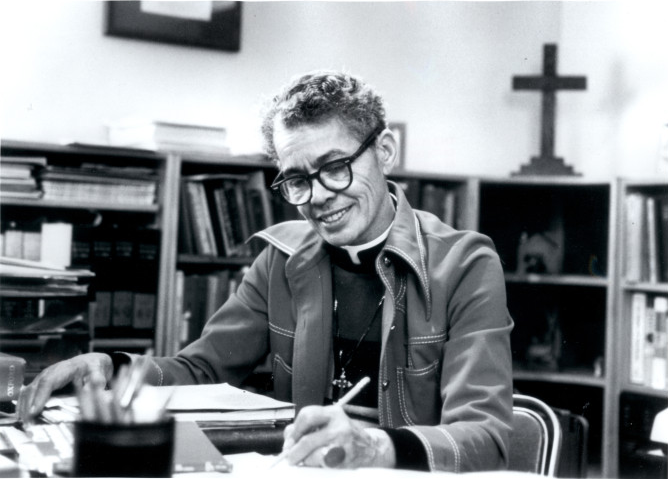Honoring Pauli Murray
We’re recognizing the remarkable life and legacy of Pauli Murray in honor of Black History Month. Though often overlooked, Murray’s significant contributions to gender rights and civil rights in the United States helped challenge the legal foundations of discrimination.
Murray was an influential civil rights lawyer, activist, priest, and writer. A trailblazer on many fronts, Murray served as California’s first African American female deputy attorney general, co-founded the National Organization for Women, and became the first African American woman to be ordained an Episcopal priest. (While the world viewed Murray as a woman, Murray wrestled with gender identity. People now have far more options for expressing their gender identity, and the Pauli Murray Center for History & Social Justice discusses Murray’s use of pronouns and the thinking behind them.)
After graduating from Hunter College in 1933 with a degree in English literature, Murray’s first jobs included working for the Works Progress Administration and as a teacher at the New York City Remedial Reading Project. Murray’s early writing included articles and poems published in magazines including the NAACP’s “Common Sense” and “The Crisis.”
Murray’s involvement in the civil rights movement deepened in 1938, when they applied to graduate school at the University of North Carolina. The university rejected Murray on grounds of race, sparking a national debate — and strengthening Murray’s resolve.
Murray began working to end segregation on public transport, and was arrested and jailed in 1940 for refusing to sit at the back of a bus in Richmond, Virginia. A year later, Murray enrolled at the law school at Howard University. In 1944, Murray graduated as valedictorian of the class, then earned an L.L.M. degree at the University of California, Berkeley, School of Law (then known as the University of California Boalt School of Law).
After returning to New York City, Murray wrote “States’ Laws on Race and Color,” a book Thurgood Marshall — then head of the NAACP’s legal department — hailed as “the Bible for civil rights lawyers.” In the 1950s, Murray continued writing and worked in the litigation department at Paul, Weiss, Rifkin, Wharton, & Garrison — as the firm’s first African American woman associate.
In the early 1960s, Murray studied their African cultural roots and taught law in Ghana. After returning to the U.S., Murray attended Yale Law School and became the first African America to earn a J.S.D. degree there.
Murray’s 1965 article “Jane Crow and the Law: Sex Discrimination and Title VII” was another milestone. It’s among Murray’s writings that Justice Ruth Bader Ginsburg — then a law professor — cited in an amicus brief Murray wrote for the Supreme Court case Reed v. Reed. The historic case marked the Supreme Court’s first recognition of women as victims of sex discrimination.
Murray co-founded the National Organization for Women (NOW) with Betty Friedan in 1966. Eleven years later, Murray became the first African American woman ordained as an Episcopal priest.
Murray’s extraordinary life is the subject of a recent Amazon Prime documentary, My Name Is Pauli Murray. It’s directed by Julie Cohen and Betsy West, who learned about Murray while making the Netflix documentary RBG. The film shines a light on Murray’s pioneering work to end racial and sex discrimination — finally giving Murray’s contributions the attention they deserve.

